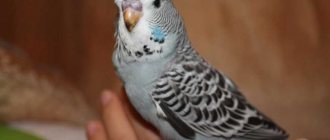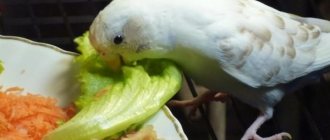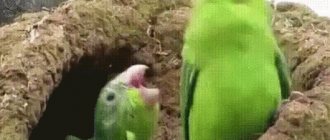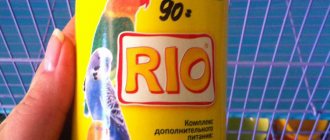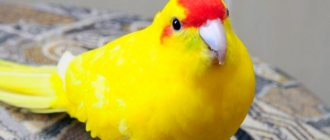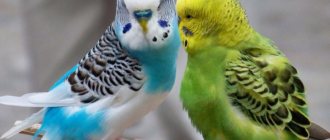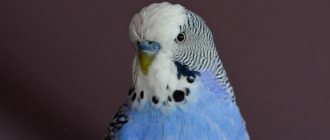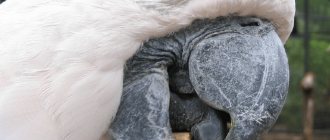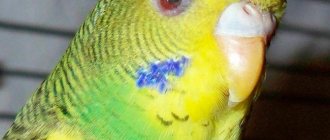From: Anastasia < eva*******@gmail.com
> Tel.: 8(966)0*******
Message: Good evening. Please answer my email. I will try to tell everything in as much detail as possible. Thank you in advance for your cooperation. Topic: "The budgerigar has lethargy, vomiting, and lack of appetite. The ornithologist at another clinic didn’t help.” I will try to tell everything in as much detail as possible. Thank you in advance for your cooperation. Kind of bird. Budgerigar. Age. About 9 months. Floor. Male. How long have you had the bird? About 7 months. How long have you been sick? About 3 weeks ago. At first there was one-time vomiting without any changes in the bird’s condition. A week later, vomiting occurred repeatedly, while the parrot’s general health worsened.
Droppings from a sick budgie
If you have already treated, then with what - in detail. It is under constant heating from a lamp. On the sole advice of an ornithologist, I added Gamavit to the water for a week. Dosage - one large division of an insulin syringe of approximately 40 ml. water. Yesterday I stopped giving. Today I started giving chamomile infusion diluted 1:1 instead of water. I change the drink every day (chamomile every 4 hours), after thoroughly washing the drinking bowl. Have you done any tests or seen a doctor? Yes, we contacted you a week and a half ago. Didn't take any tests. Symptoms: The parrot sleeps a lot, is constantly disheveled and shakes a little. Lethargic, does not play, chirps little. Periodically sits on the bottom of the cage for 10 minutes to an hour. Vomiting, liquid droppings. He eats little, he doesn’t even eat a teaspoon of grain mixture a day (previously he ate 2 teaspoons a day). Today I gave buckwheat porridge through a syringe. As usual, he drinks little. Breathing is normal. During the entire period of illness (11-12 days), I noticed twice that when I exhaled, something interfered for a moment, but it immediately went away. The beak has grown a little, the eyes and cere are in normal condition, there is no discharge. Paws of normal color, cold. Has the litter changed? Changed. The droppings are thinner than before. The first days of illness are the usual lump of dark green color with white streaks, but surrounded by a large amount of dark liquid. When washing the cage, when water gets on the tray, it immediately becomes dark in color (previously the color was not so rich). Last night the droppings consisted of clear liquid with white streaks and no feces. Today's litter is as in the photo. At the beginning of the disease, the parrot's tail, the edges of its wings and the feathers around its butt became dirty. That is, smeared spots appeared, as if from dirty water, without feces. Today there was some feces stuck to the feathers around my butt. Was there vomiting? Was. He jerked his head, and hulled, but whole, undigested grains flew out of his beak. The last time was more than a week ago. What do you attribute the onset of the illness to (change of food, caught a cold, hurt yourself, ate something suspicious, etc.)? I'm trying to understand this myself. There was a change of food. The first time was about 3-4 months ago, but yesterday he refused this food, so we bought another one. More details below. How much does a bird eat per day? Is your appetite good? The bird's activity level. I wrote about this in symptoms. What is the fatness of the bird at the time of treatment, how many piles of droppings does it produce in 1-2 hours? Weight – 25-27 grams. The keel began to protrude more. At this point, the keel bone is sticking out, but the muscles are palpable on the sides. There are fewer litters than before. Maximum 1 pile per 2 hours. Was there a change in food in the period before the onset of symptoms? There was, I already wrote about it. If the food has not been changed, how long ago did you open a new pack of food? The food that was given during the onset of the disease - a week before the first signs appeared. If poisoning is suspected, what indoor plants did you have access to? Didn't have access to indoor plants. Could the bird have swallowed a small inedible object or chewed on materials not intended for this purpose? Could not. Were aerosols or chemicals sprayed in the room? Floor/carpet cleaners etc? Fumigator? Teflon coated iron? No. Is it possible to smoke in the room where the bird lives? They don't smoke. Was there any smell of paint, gas or other strong odors? Was there any repair work (dust, primers, etc.)? Did not have. Is there a bird living in the kitchen? No, the bird lives in the bedroom. If the bird lives in the kitchen, do you use non-stick cookware? Birds do not live in the kitchen; non-stick cookware is not used. If the bird lives in the kitchen, did the food burn in the presence of the bird? The bird does not live in the kitchen, it did not burn. Are there any negative factors (drafts, humidity or dry air, poor lighting, stressful situations, etc.)? There are no drafts. The air may be a little dry. Daylight falls unhindered on the cage; in winter, in the evening, the lighting from the chandelier was average. The parrot was stressed when we bought it, because we bought it the day after it was brought to the pet store, and during that night other parrots beat it (it stands out for its color), tearing out several feathers. I think he was under a lot of stress because of this, as he is slow to adapt and very distrustful. Also, shortly before the first vomiting, I had to catch him with my hands, since he got too excited and didn’t fly into the cage, and it was time to sleep. What grain mixture does the bird eat? Please indicate the NAME of the grain mixture. If the mixture does not have a name (by weight), then the composition. Witte Molen Premium, RIO, Padovan Grandmix Cocorite, more details below. Provide details about what is included in the diet in addition to the grain mixture. Sticks (I don’t remember the brand), Fiory Biscottelli biscuits. I read a lot of negative things about them, I won’t give any more. Before this, the stick hung for a month, the birds did not touch it. However, in the middle of his illness, he ate it completely in a few hours. They stopped serving the biscuit long before the first signs of illness; they simply forgot about it. Do you give Trill or treat the bird with food from your table? If you do, what kind and how often? No, they didn’t give anything other than the above. What vitamin supplements does the bird receive and in what dosages? I wrote about “Gamavit” above. Nothing else. What mineral fertilizers do you give, and do the birds use them? Minstone, sepia, crushed oyster shells, liquid mineral fertilizer? There is chalk hanging in the cage, the parrot does not touch it. What kind of water do you give and how often do you change the water in the drinking bowl? Indicate the type of water: tap, filtered, boiled, purchased (name). I give boiled water, change it daily, thoroughly washing the drinking bowl with tap water. Now I give chamomile infusion and change it every 4 hours. Have any new birds appeared in the house in the last two months? If yes, then more about it. No, they didn't show up. Is the bird kept alone, in a pair, or in a flock? If there is another bird(s), how is it/them feeling? We have only one. Are birds in direct contact with rodents? No, it doesn't happen. Is the bird outgrowing its beak? It outgrows, but not much. Are there any problems with the plumage: permanent molting, undeveloped or deformed feathers, disheveled and brittle plumage? Feathers are disheveled. The plumage has not faded and does not shed. Lifestyle. He lives mostly in a cage; before his illness, he was allowed to fly under supervision once every 3 days. The length of daylight hours is on average 14 hours. We cover at 23:00 and open at 9:00. During departure we do not cover it at all. City. Moscow. Describe the symptoms of the illness in detail and tell us about everything that may be related to your bird’s illness: We bought Kesha at the pet store the day after delivery. During the night he was beaten by other parrots, tearing out several feathers, possibly because of his color. Apparently, due to this, he experienced stress, so it took him a long time to adapt; he still doesn’t trust me, although I try to work with him every day. Not talking. Only sits on your hand in a cage. Outside the cage he runs away from me. The only thing is that he flies home on his own. Read more about feeding. After the purchase, Kesha was fed Witte Molen Premium on the advice of a consultant at the pet store. I ate willingly, there were no problems. When the food started to run out, we couldn’t find the same kind in the nearest stores, so we took RIO. At first I tried half a kilo, everything was fine. Then we bought a kilogram, and then problems began, more on that later. Yesterday I gave up RIO; due to inexperience, the first thing we decided to do was change the food and bought Padovan Grandmix Cocorite. Like, you never know, the cause of the disease is RIO, and Kesha, feeling worse after it, stopped using it. Initially, they poured half of the feeder until it was eaten (it was enough for about a week). Recently they started giving 3 teaspoons, which was enough for 1.5 days. Well, I wrote above about how much he eats now. And about additional diet too. Now let's get down to business. About two weeks after opening the second pack, RIO noticed that Kesha began vomiting. He shook his head from side to side, as if he was choking, and hulled, but not digested, whole grains flew out of his beak (as if they had not passed beyond the crop). At the same time, he was in absolutely normal condition, cheerful and active. I thought I had eaten too much, took the food from him for a couple of hours, it went away and didn’t happen again until recently. 11 days ago we were forced to leave for a couple of days and left Kesha with more food and water, as usual. We returned 2 days later and found signs of vomiting (the same grains again), and the parrot was in a depressed state. He either slept all day or sat in one place, ruffling his face. Chirped occasionally, did not play. He became quite dirty, part of his tail and the feathers around his butt were dirty, although he is still a clean guy with us. I ate a little and drank as usual. The next day nothing changed, in the morning I started vomiting again, so we decided to call a veterinarian. There were no trusted ornithologists in sight, so they called from the nearest clinic and were disappointed. Not only did the ornithologist give the impression of a completely uneducated person and didn’t say anything sensible, but he also took a lot of money. In general, when he was called, we were told the amount - 1,500 rubles, which included a visit, examination, treatment, and analysis. Maximum of another 500 rubles if medications are needed. This has been clarified several times. When the ornithologist himself called back, he announced a maximum of 4,000 rubles if the bird was in VERY serious condition and would have to be operated on on the spot. However, by the time the veterinarian arrived (he was 3 hours late), Kesha was already indignant at the fact that his food was taken away, he played, ran around the cage and chirped with all his might. Only during the breaks he chuckled again and shook a little. And then the “specialist” arrived. I looked at the cage from afar, and I told him about all of the above. And silence. Without waiting for an answer, I decided to add that initially we gave heavily fortified Witte Molen Premium, and now we changed it to empty RIO. In general, the ornithologist seized on this. Like, Kesha is stressed because of the change in food, the parrots are having a hard time with it (we only changed the food about 3 months ago, how can stress last that long), especially since at first he received a large amount of vitamins, but now he doesn’t. I read that it could be anything, goiter inflammation, for example. This veterinarian immediately ruled out everything, although he didn’t even touch Kesha, didn’t feel the goiter, didn’t examine him. I paid attention to the feces only before leaving, saying that the bird’s feces were normal (although, in my opinion, a bit runny). So here it is. The ornithologist further added that wavy birds have a weak liver, and they cannot eat highly fortified food, like Witte Molen Premium, but rather the simplest ones like RIO. Next, he suggested giving the bird some vitamins. I had to pick up Kesha because the vet categorically refused to do so. Then he began to pour Gamavit and some other vitamin L into his beak, holding the beak with shaking fingers and looking in fear at what was happening, as if he was doing this for the first time (Lord, how does he work with larger birds like the macaw). Then he asked to return the bird to the cage and prescribed treatment - each time add one large section of a Gamavita insulin syringe to the drinking bowl until Kesha’s complete recovery. I was also confused by the fact that when I asked which was correct – “Homovit” or “Gamavit”, he answered – “Homovit”, but it turned out to be correct – “Gamavit”. Next, this “specialist” issued an invoice - 4,000 rubles. For what??? Okay, we were confused, because our friend’s health is more important (then there was another showdown with this veterinary clinic, but I won’t talk about that). While we were transferring funds to his personal account, he added about feces (wrote above) and said that Kesha is in good condition, and if he is really sick, then we will not save him, wavy animals cannot be treated and die with any disease. Kesha also started vomiting again in his presence (apparently from the forcibly infused vitamin), to which the doctor said: “Oh, what is he doing with you? Hmm, is this vomiting? Yes, that’s how they usually play.” I almost fell here. In general, after this inspection we were completely disappointed and decided: come what may. But the next day Kesha felt better. He was still disheveled, but more active. And the next day he behaved as usual. I spent half a day cleaning the feathers, but decided to hold off on washing for now, let it get stronger. Played and tweeted. Then I was forced to leave again for 4 days, leaving Kesha with her husband. Further from the words of my husband. The first day everything was fine, I changed the water, added vitamins, added food, because Kesha had already eaten everything. For the next two days, Kesha did not touch the food at all and ate the entire stick (even though he had not touched it for a month before). On the fourth day, overnight and in the morning, he ate all the previously poured food, and my husband added more at lunch. He was disheveled in the morning, but then moved away. Activity was normal. Yesterday was the fifth day, I’m already home. In the morning he chirped and played with the birds, but did not touch the food at all. As my husband poured it last time, it remained in that amount. By lunchtime, Kesha got ruffed up again, went down to the floor (this has never happened before, he mostly always sits on perches) and sat like that for an hour. Then he approached the food several times, but did not gnaw it, but simply scattered it. I decided to pet him, he played and asked to fly. She released him, but he turned out to be very weak. The first time I couldn’t fly above the middle of the room. Then, with grief, he flew to the cornice (his favorite place). Then he flew over to the TV, but couldn’t resist and fell behind the cabinet. I helped him get out, he flew into the cage. We decided to change his food since he didn’t eat this one, because we were afraid that he would die of hunger. On the advice of a consultant, we bought Padovan Grandmix Cocorite. Of the new food, Kesha chose only soft grains; the rest is free to eat. Then I decided to try giving him a biscuit, because I was very worried that Kesha had not eaten for a long time. I decided that I should try to whet his appetite, and he loves Biscottelli very much. He ate the biscuit willingly, even if only a little. Next, I left the cage open. What happened next surprised me. He chirped for a long time, and then flew out of the cage and sat on my leg! Although, as I wrote earlier, outside the cage he shied away from everyone. Then he flew off, thought for a moment and came back. For the last 3 hours, he either sat next to me, then on me, or walked on the floor, not being scared if I passed by, and was calm if I took him in my hand. Chirped, sometimes returned to the cage and played a little with the toys. However, he did not eat food from the feeder or hand, he walked on the table, the floor and collected grains that had previously been scattered by himself (even RIO), he ate them normally and completely. I poured some Padovan grains onto the floor and table and picked out a little. Then he chirped and washed himself. But he was still very disheveled and disheveled. He flew around the room several more times, already high. Oh, and also, he often swung his tail from side to side all day. Today he has been weak all day and mostly sleeps sitting under a lamp. He eats very little. She was force-fed boiled, ground buckwheat porridge from a syringe. Well, how forced. She took it in her hand, he screamed, and then he himself began to peck the porridge squeezed out from the syringe. True, most of it flew past, I hope that at least something got into the beak. “Even though it ran down my mustache, not a drop got into my mouth.” I changed my usual drink to chamomile decoction. At night I’ll leave him a lamp, ground buckwheat porridge mixed with a grain mixture (it seems to bite) and plain water. By the way, they called the “specialist” whom they contacted earlier, he suggested dropping glucose into the water and some kind of supporting drug for L. And yet I’m worried. Tell me what this could be, what treatment should I choose? For now I’m thinking of giving Nystatin, Bifidumbacterin, and leaving chamomile. I also read on the forums about activated carbon, they say it is given for poisoning, but is it worth it?
Diagnosis of a parrot based on your data
Good afternoon
In a parrot, it all started with inflammation of the goiter and ended with malabsorption, cachexia and hypothermia.
Treatment:
1. Heat up to 30 degrees ambient
2. Tube feeding the parrot with a mixture of canned baby meat 50% + yogurt 50% mixed and given into the crop.
3. The drug temperin, 10-15 grains in the drinking bowl and 1-2 grains in the beak, several times a day
4. Linex or primadophilis on the tip of a knife in a drinking bowl along with temperin.
5. Show the parrot at the Green Parrot bird hospital and conduct microbiological studies, and only on the basis of them adjust further treatment.
Sincerely, Vladimir Romanov
Reasons why a parrot stops flying
There may be more than one reason why a parrot cannot fly. This is influenced by a number of sources.
The reasons why a pet parrot stopped flying can be eliminated with the help of the owner’s kind attitude. This happens when a bird finds itself in an unfamiliar place, a new environment. It will take time, the bird will adapt. Throughout this period, one must not forget about the new family member. Talk to him, look after him.
The remaining reasons are complex and have to be eliminated in other ways.
Unbalanced diet
Feed is an important element in maintaining poultry health. It is no coincidence that specialized stores sell food for poultry containing all the necessary elements: proteins, fats, carbohydrates.
When purchasing food, you should carefully read the instructions. You need to know and follow feeding standards. Overfeeding is not beneficial.
It is dangerous to use the wrong diet for feeding. After incorrectly selected food or supplements, owners wonder why their pets behave strangely. Why, for example, does a budgerigar not fly as it should, but walks on the floor?
The main reason is the changed portions themselves, the wrong food, which affected the general condition of the bird. In addition to walking, other symptoms are also observed:
- apathy may occur;
- the bird will become passive and will often fall asleep;
Lack of vitamins will cause obesity. The accumulation of fat will contribute to feather loss, shortness of breath, a decrease in the level of the immune system, and diseases of the internal organs.
Even worse things could happen. When lovers of exotic birds ask a question such as “the parrot sat on its legs and does not move,” what to do, it is often an unbalanced diet that is indicated as the reason for the failure of the legs.
Infections and parasites
When the owner observes that a mischievous wavy parrot has stopped flying as before and often falls, the reasons can be found in the internal state of the bird’s body.
Infections will dramatically worsen the bird's health. Weakness will appear. The reason will be a constant desire to block the source of the disease, an internal mood to eliminate the vital activity of harmful microorganisms.
Internal organs are infected. The domestic feathered friend is unable to fly. A parrot, whether in a cage or outside it, constantly has its wings drooping; it cannot straighten them.
The bird is tormented by parasites. They can be detected by small holes in the corneas or scratches and bites. The bird begins to lose feathers. This is another sign of the presence of parasites.
Endocrine system disorders
A sick thyroid gland is associated with hormonal imbalance. The endocrine system is disrupted. A number of symptoms appear that make it difficult to fly.
Ornithologists point to the manifestation of external signs of a bird’s impaired immune system. In particular these are:
- reluctance to leave the cage even with the door open;
- depression;
- refusal of food;
- frequent sleep;
- dyspnea.
Injuries
Wavy pet friends are small, nimble, and beautiful. Their plumage comes in a variety of shades: green, yellow, blue. They can easily be missed on colored bedspreads, on floor coverings, and other places where they can sit. Therefore, veterinarians are not surprised when they are told that the parrot was stepped on, which is why it stopped flying as before. The diagnosis of a fracture in such cases is not uncommon.
The owner goes to the veterinarian when he notices in time how the parrot has damaged its wing, getting stuck between the bars of the cage, because only a specialist knows what to do. Physical injuries do not only cause severe pain to people. You need to remember this.
Stress
Stress in a bird can occur with any unexpected life changes. Change of housing, rough treatment, presence of large animals (especially cats) in the house.
If you seriously ask yourself why the parrot is suddenly running around the cage like crazy, back and forth, you can avoid many of the problems that the bird will face. Avoid feather loss, restore her good appetite and desire to fly.
Wrong cell selected
When a parrot sitting in a cage flaps its wings, it means that it wants to warm up. The cramped conditions in which the bird finds itself do not bode well. A budgerigar feels great when it starts to fly when its home is almost 10 times its size.
The choice of cage must be approached responsibly. It is important to remember that it is taken for a living being.
Correcting the situation
After establishing with the help of a specialist the reasons why the parrot flies poorly in a spacious room and often falls while in and outside the cage, you should begin to eliminate the source of the trouble.
- If this is due to poor nutrition, which develops vitamin deficiency, the food intake is corrected and a special diet is introduced. In 2-4 months everything will return to normal.
- Parasites are removed by treatment prescribed by a doctor and by treating the cell with special-purpose drugs.
- Problems with the endocrine system are solved by including foods that contain iodine in the food.
- Only a veterinarian can properly treat bird injuries.
- The owner himself can eliminate the source of stress. You can move the cage to a quiet place where it will be warm, light and there will be no cats nearby.
Each negative cause is eliminated in a certain way, and soon the sound of its wings will again be heard under the ceiling of the room where the cute, talkative bird lives.
Previous
UsefulStructure and anatomy of parrots
Next
UsefulHow and when to trim a parrot's claws
Hypothermia of a budgie
Good afternoon
Good afternoon ! In case of hypothermia, which occurs due to open drafts when opening windows, vents, or using air conditioners. Parrots can actually get sick. In this situation, the Green Parrot bird hospital successfully uses the drug Rinbronchus, which removes the effects of inflammatory reactions from hypothermia. Rinbronchus is given by drinking 10-15 grains through a drinking bowl every day for 1 month. It is also useful to support the gastrointestinal microflora in birds by introducing probiotics into the drinking bowl - for example, primadophilis, or bifidumbacterin on the tip of a knife for 1 month. Vitamin preparations are also in demand when birds are sick. If treatment does not help, then in this case it is necessary to show the parrot to a veterinarian and have microbiological laboratory tests done.
Sincerely, Vladimir Romanov
Causes
Birds can also be susceptible to diseases. If the parrot has become lethargic, this is a sign that he is unwell. In most cases, the manifestation of symptoms of the disease is associated with improper care of the bird.
Fast metabolism contributes to the rapid development of various pathologies. If the breeder does not learn to react correctly and in a timely manner to external changes in the behavior of the bird, this can lead to a severe form of illness or death. The appearance of lethargy is the first signal and symptom to determine the causes. It may develop slowly and in some cases appears suddenly. The reasons are varied:
- Diseases (colds, infectious, non-infectious, parasitic);
- Poisoning (vomiting, refusal to eat, black droppings);
- Trauma (physical injuries received during flight or careless handling of the bird);
- Psychological factor (depression due to separation from the couple, stress, change of owner).
Most often, the reason lies in poisoning and depression.
Budgerigar spits and spits out food
From: Nikolay < nikosl*********@mail.ru
> Tel.: +7 902 13*******
Message: Hello! Please tell me about the question. I have two budgies. Three days ago I noticed the second (blue) one was in poor condition. He got ruffled. Almost always asleep. Sometimes he drinks and eats a little. But he noticed that he was eating food through force. After eating, he seems to spit it out almost immediately when he returns to the perch, as if vomiting. Diarrhea with water. The parrot itself is lethargic and closes its eyes. I'm sorry that due to the recent heating shutdown, the room was cool, because... The temperature outside was very cool and the drop was sharp. The food has been eaten for a long time, the water is changing. There is a cockatiel mineral stone in the cage. Suspicion of goiter inflammation. Tell me what could be and what can be done. I am writing to you from the Murmansk region. We don't have any veterinarians for googai. Thank you in advance.
How many hours a day do parrots sleep?
To exclude pathological manifestations, it is necessary to have a good understanding of the normal sleep duration of birds.
In nature
The life of parrots in their natural habitat is very different from that at home. These birds live on the Australian mainland, where the climate is very hot. By mid-day, rising temperatures make sunbathing life-threatening.
The birds climb into the shade, where they rest during the day. Instincts are preserved at the genetic level, so pets can also nap during the daytime. The average duration of bird activity is from 10 to 14 hours.
At home
For birds living in a human home, the daylight regulator is a person. If the power is turned off and the change of day and night occurs randomly, this affects the health of the pet. He ceases to understand exactly when night falls and day begins, which often entails a long daytime nap.
A bird's normal nap should last at least 12 hours in summer and at least 14 hours in winter. If the bird has been overly active all day and played a lot, then the duration of sleep may increase slightly.
What affects the duration and quality of sleep
Various factors influence how long and quality a pet’s sleep will be.
Wavy falls asleep/bird/sleeping
Conditions of detention
If the cage is in a noisy place or insufficiently lit, this may disrupt the regime. Improper keeping of birds, an unbalanced diet or poor sanitary conditions affect the well-being of the bird, the quality of sleep and can cause poisoning or infection with parasites.
Daylight hours
As soon as the lighting becomes less, the parrot begins to fall asleep. If the light turns on in the room, the bird will wake up. In the summer, it is recommended to keep the cage covered for about nine hours so that the bird can get a good night's sleep. The fabric for the cover should be dense, but well breathable.
Noises
If there is conversation in the room, music is playing or the TV is on, then the pet will definitely not sleep, and during the day it will begin to make up for the lack of sleep. Such violations of the regime will negatively affect his health if they are habitual and constant.
WHERE DOES THE PARROT SLEEP//HOW DOES THE BUDGET RESPOND TO THE WEATHER//green parrot TV
Diseases
The bird may be sick or injured. If the parrot does not sleep or, on the contrary, sleeps all the time, then you need to examine it and pay attention to how it eats and the state of its bowel movements. Examine your pet thoroughly and, at the slightest suspicion, contact an ornithologist.
Treatment of goiter in budgies
Good afternoon Treatment of goiter in budgies requires the use of a variety of medications and, of course, desirable microbiological tests, which can be carried out to identify pathogenic fungi and bacteria. Based on the results of determining such microflora, antibiotic therapy is carried out or not. It is also necessary to conduct microscopic examinations of birds to identify parasites. When identified, treatment is also carried out. However, before testing, you can also suggest treatment, which may well help. Firstly, probiotics linex or primadophilis or bifidumbacterin are used, which are given at the tip of a knife into the drinking bowl. It is also advisable to give the drug Immunim or Nephrogep, and possibly temperin (I find it difficult to determine which one, since you did not write the age of the sick bird, and the body temperature of the sick bird). Vitamin preparations such as Mauser or Vinky can also be given. Also warm.
Sincerely, Vladimir Romanov
Common disease in parrots: self-plucking and feather eating
This is a fairly common disease in pets kept in poorly ventilated enclosed spaces.
. If the disease starts, it will be very difficult to rid your pet of the habit of pulling out feathers.
Diseases leading to self-plucking:
- giardiasis;
- stress.
But self-plucking rarely involves just one factor. Often this problem is cumulative. Thus, trouble can come in the event of poor nutrition, insufficient bathing, infringement of the rights of birds, poisoning, chronic bacterial infections, hormonal fluctuations, food allergies, etc.
You yourself are unlikely to find the cause of self-plucking, so a trip to the veterinarian is mandatory. Feather pulling cannot be caused by behavioral factors alone. In any case, there is at least one physiological reason!
Addresses for purchasing budgies
Good afternoon Yes, you can purchase a budgerigar from the nursery of the Green Parrot bird hospital at five addresses: 1. Moscow Olminskogo Prospect, 3A str. 3 tel 8916 065 70 05 2. St. Petersburg Vasilievsky Island Kartashikhina, 12 tel 3. MO Balashikha Shosse Entuziastov d 1 tel 8 495 521 -84 50 4. MO Bykovo Osechenskaya st. 27/31 tel 8 925 -72 65 10 5. Spassk Ryazan district Papushevo village 16
Sincerely, Vladimir Romanov
YOU CAN GO BACK TO THE LIST OF DISEASES AND TREATMENT OF PARROTS
Bird Hospital "Green Parrot" - treatment of parrots and ornithologists in Moscow and St. Petersburg. Did you like the material?
Prevention and first aid
Most often, parrots suffer because of their curiosity. If signs of poisoning appear, you should never wait to see what will happen next. You need to call an ornithologist or veterinarian, and before his arrival, do the following:
- Ventilate the room. It may have accumulated paint fumes, tobacco smoke, or other hazardous substances.
- Give your pet an adsorbent solution at the rate of 1 ml of activated carbon per 50 g of the bird’s weight.
- Feed your pet. Give him 1.5 - 2 ml of ground porridge diluted with water or saline solution.
- Instead of water, you can make tea or chamomile infusion.
- If vomiting, drop 1 drop of Tsekural into the beak.
- If the bird is dehydrated, you need to drink 2 ml of Ringer's solution every 2-3 hours.
- "Karsil" is given when the color of stool changes: 1 tablet per day.
- A sick pet is warmed up using a lamp.
What to do if your parrot is cold ||
How to warm a parrot while there is no heating Important! In case of carbon monoxide poisoning or a toxic substance that gets on the skin, the sorbent is not given. It is not used in drug treatment because it weakens their effect.
Disease prevention includes the following measures:
- use of high-quality feed and water, vegetables and fruits;
- absence of drafts;
- proper lighting and ultraviolet light;
- cage and equipment hygiene;
- temperature regime;
- silence and order in the house so that the pet is calm and does not become depressed;
- regular inspection of your beloved parrot for ticks and fleas;
- visiting a doctor for prevention.
By following these simple rules, you will enjoy communicating with your feathered friend for a long time.
https://www.youtube.com/watch?v=BbfMWFumygI

